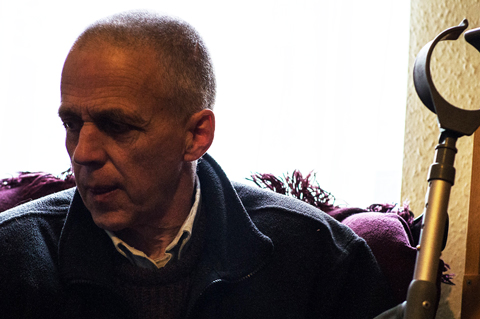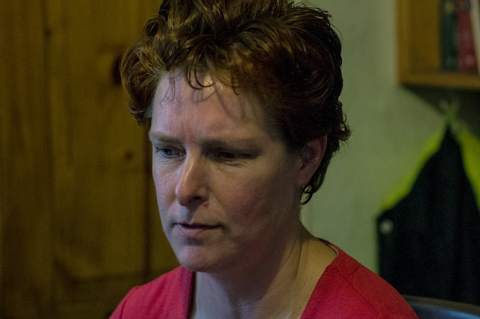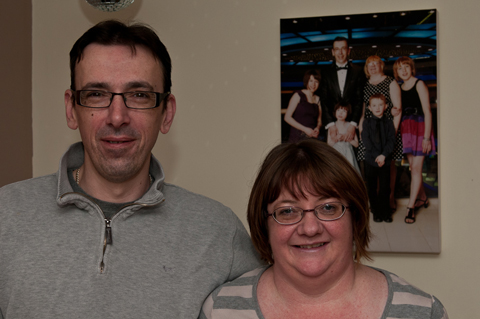This year, I’m talking to people in different parts of the country about the ways that welfare changes, NHS reform and council cuts and charges (particularly in social care) are affecting lives.
Most of the people I’ve spoken to use a range of services and are affected by changes across the board – ESA and DLA assessments, council social care cuts and charges and NHS reform. Apparently, only 12% of the government’s cuts have been implemented. People are on edge waiting for the rest.
Extracts from these articles are appearing the Guardian here and in the Society Guardian.
This first report is from the Northwest.

“A lot of people have got to be in this position…forced to finish work in one way or another and unable to get any money…it’s a threatening prospect.” Richard Atkinson, Cheshire (photograph: Charles Shearer)
I start to understand that care cuts and costs might be leading people to take risks with themselves when I go to Lisa Henshaw’s* house and find her front door unlocked. I knock, hear her call out, and I try the door, which is open.
“Wow,” I think, brilliantly. “That’s not very secure.” I wander down the hall to find her. Then I get it.
Henshaw, 48, has rheumatoid arthritis (she was diagnosed when she was two). She has limited use of her hands and does not walk easily. Mostly, she must use her electric wheelchair to move. This morning, she woke up feverish and “very, very shivery.” That’s how I find her – a small figure lying on her bed next to a red plastic container that her carer left out in case Henshaw needed to be sick.
She’s alone, because “I’ve run out of carer hours,” she says, grimly. Direct payments from her local council fund about five carer hours a day (starting with a couple of hours in the morning, to help her to bathe and dress) and her carer had to leave at ten for another job.
She didn’t want to ask another carer to come, because “I have to preserve my [care] hours… for an emergency.” The front door was unlocked, because Henshaw was waiting for medicine to be delivered and was worried about missing it. So – I end up waiting for the drug and signing for it and making Henshaw her mid-morning hot drink.
Then, I leave her to her problems.
She has plenty of them – “it isn’t always gloomy like this,” she says, “…but I never had to worry like this before.” Henshaw faces an ESA work capability assessment (which will cost her – she’ll have to pay a carer to fill in her forms for her) and a Disability Living Allowance assessment. She was given a lifetime DLA award as a child, but will be reassessed as the personal independence payment replaces DLA.
There’s also the ongoing issue of Henshaw’s living arrangements. Henshaw wants to keep living in her own home, but will need extra care for that as she ages.
She isn’t too sure that funds will be available, though, and worries that her local council will put her in a carehome. It’s easy to see why she wants to stay. She’s made her housing trust bungalow a magical place. Each room is a riot of retro – flowered walls, bright surfaces, lustrous curtains and winking lamps. You want to follow the lights and explore it.
Henshaw just wants to stay in it. Her concern is that her council will look at her requests for more carer hours, decide that it can’t afford them, say that she’s at risk alone and move her to a carehome. So, she needs to fight for extra care hours without drawing her council’s attention to the fact that she needs extra care hours. There isn’t an answer to this, but that hardly helps. Henshaw torments herself trying to find one.
The irony is that there might not be a carehome, either. Council officers told Henshaw recently that they didn’t have suitable spaces. So, in Henshaw’s mind now is an end-scene where she is stuck in her beautiful home without enough help. Doors are shutting wherever she looks. The Independent Living Fund has closed (people with disabilities were once able to apply to the ILF for extra money for care). In some parts of the country, councils are, incredibly, capping spending on high-cost care. On her bad days, Henshaw imagines how those chapters of the story might play.
—————–
In the video below, Richard Atkinson speaks to a meeting of about 100 people with disabilities in Chester about welfare and NHS reform and social care cuts.
Atkinson has multiple sclerosis. He was diagnosed seven years ago. His right arm and his legs are weak and he walks with an aid. He is often exhausted and talks about taking ill-health retirement (he has worked fulltime at a nearby council for many years).
He and his wife, the journalist Frances Laing, are, they say, “adjusting.” They were keen fell-walkers once – “everyone used to make jokes about how fast Richard walked and nobody could keep up with him,” Frances says. “That’s illustrates the changes you have to adjust to.”
Frances and Richard aren’t altogether sure what will happen if Richard leaves work. Richard doubts that he’ll be able to rely on ESA in an ongoing way, because he’ll have a pension if he takes ill-health retirement. “We’ve got ten years to go until we get the state pension.”
That decade hangs in both minds. Richard talks about working part-time, but that’ll depend on his health. Frances is a freelance journalist, but has found it harder to work as Richard’s MS has made more demands on her time. They also have a six-year-old child to look after.
They worry, too, that health and care systems are too stressed to cope with the demands they have now, let alone in the future. They got a taste of that the week before Richard spoke at the meeting in the video above.
On the Thursday before the meeting, Richard went into hospital for a hernia operation. Frances suspected that Richard wouldn’t respond well to the surgery – that he’d be too tired and weak to move.
So, before he went into hospital, Frances “tried to access various things, like an occupational therapy assessment to get stair rails on the stairs (the bathroom and bedrooms are upstairs in their home). They did an assessment over the telephone, but then they said it would be three weeks before someone could come round.” That appeared to be that.

Frances Laing, Cheshire (photograph: Charles Shearer)
Frances was right to think the operation would affect Richard badly. “It was like six months (of the MS advancing) in a day,” he says. He fainted in hospital at 3am the morning after the surgery and was barely able to move when he was brought home.
“I couldn’t get him up the stairs,” Frances says. He couldn’t get to bed. He couldn’t get to the toilet. “The only thing we had got,” Laing says dryly, “was a bucket…. That was the weekend from hell.”
Richard was offered a reablement package by his local council: – “somebody coming in twice a day to help Richard get washed so that I could go out to school and pick R_ up… but there was a Catch-22 there,” Frances says. “The careworkers wouldn’t help Richard up the stairs, because the occupational therapy assessment hadn’t been done.”
There was also confusion, which didn’t inspire: “In the first week, they didn’t have Richard’s medical details right. They had written down that he had cerebral palsy.”
Then, on Saturday night, Frances says, “there was another very disturbing example [of chaos]. The carers knocked at half past six and said they were there to see Kenneth. There’s nobody called Kenneth in this house.”
This all feels, Frances says, as though “your house is burning down and nobody can see it.”
And really – nobody can see it. An example: Richard went for a short walk down their quiet street a morning or two ago, with his cane, to see if he could manage that as he recovered from his operation.
“A careworker came that day,” Frances says. “We’d never seen her before. She said – “if he’s on a care package, what is he doing going to the shop?” I didn’t know what to say. I was thinking – do we have to justify ourselves again?
————–
Rescue via politics seems a forlorn hope. Councils like Wigan, Lancashire, Bolton, Salford, Manchester and Liverpool councils passed sweeping job and service-cut budgets in February and March with barely a ripple on the national scene.
Budget meetings like Manchester’s even had a sinister touch of the lightweight to them. Manchester City Council is in the second year of a monumental £170m budget and job-slashing exercise, which isn’t particularly amusing. Sitting at this year’s budget meeting, though, it was hard not to feel that gravitas was also in short supply. You can get a feel for this from the video below.
Councillors giggled as Labour and Liberal Democrat speakers ran a sort of Silly Pictures contest in their presentations. Labour had Cameron cuddling Clegg in a blanket and the Lib Dems offered the meeting a mockup of the council leader’s chauffeured car:
But make no mistake – people are furious at councillors. The video below shows local people and councillors in Bolton at war with each other over job cuts, service cuts and the failure of Labour (in this case) councillors to join local people in their battles.
This video was taken at Bolton town hall in February on the night that Bolton council agreed its latest cuts budget – £18m gone in an ongoing slaughter which could ultimately claim another 1000 jobs.
“They (Labour councillors) should be here on the stairs campaigning with us,” Tom Hanley, chair of the Save Bolton Libraries campaign, told me. Unfortunately, that sort of united action doesn’t appear to be immediately on the cards. Confronted with an angry protestor on the stairs, one councillor turned round and screamed “Fuck off!” at him.
Some people manage to hold off the cuts and modernising juggernaut. They just make the point that they’ve steered clear of party politics to do it.
Skelmersdale resident and Firbeck and Findon council estate tenant Hazel Scully talks about this in the video below.
Scully and a group of campaigners on Firbeck and Findon just won a five-year fight to stop West Lancashire borough council demolishing their town centre estate. The council was proposing to knock the estate down as part of a town centre regeneration project.
Hazel and her husband Ted had lived on Firbeck and Findon for 34 years and raised their two sons there (the boys went on into the army).
To save their estate, tenants organised meetings and petitions, learned how to analyse council papers and to attend all meetings at which their estate was discussed.
They also made sure to form relationships with council officers and councillors – it was vital, Hazel says, to stay on the case and the radar.
The council dropped the proposal to demolish Firbeck and Findon in December last year. Hazel thinks that was partly because of the tenants’ campaign and partly because the recession gave the council pause on major building projects (the council cites the economic climate in reports when discussing its changed tack). Whatever it was, there was something left at the end of it – “[mutual] respect where there wasn’t any,” Hazel says.
The council is working with local people to improve Firbeck and Findon. Already, some refurbishment work and re-painting has been done.
Some people are dealt impossible cards, though. This isn’t much of an era for those who need state help: even people who need it don’t always think they deserve it.
I meet Jack Sandys* and Dave Pickles* out the back of their home – a hostel for men in Warrington. Dave rushes over when he sees me sitting by myself on the concrete wall by the staff carpark.
“Don’t sit there, love,” he says, shocked. “You need to be careful. Some of the men in there [he points to the hostel] are animals.”
Jack has been in living in the hostel for about seven months. Dave – perhaps a few years. He’s very drunk, but, somehow, coherent. He and Jack have set up a small watering-hole round a recycling bin down a side road by their hostel. There’s a radio and a few plastic mugs on the bin.
They say that they’re both on benefits and that they’re not allowed drink, or women, in the hostel. “Self-inflicted,” is all Dave can manage when I try to move to a discussion about sympathy for alcoholism and addiction in this day and age. “Self-inflicted.”
They offer me cider, but I don’t take it. They’ve almost finished their bottle and I don’t want to drink their last cup. I know alcoholism very well and so I know that they will have to spend the day looking for more cash for drink as it is. Not taking their last cup of cider feels like a sort of donation. Jack says he’s just pawned his phone.
“Have you something to eat, then?” Jack asks. He pulls an orange out of his jacket pocket. “Here,” he says. “I get me tea tonight, so you’re all right. You’re welcome to that.”
“It’s just so nice to talk to a woman, isn’t it, Jack?” says Dave. He puts his hands on my shoulders and strokes them. “I’m sorry for touching,” he says. He takes his hands away, then puts them back. “This is so nice,” he says.
“Isn’t it nice?” Jack says. He likes living in Warrington, he says. It’s the general direction of the nation that worries him.
“It’s a load of cack, our country. Everyone’s fighting with each other…”
“Everyone’s fighting a war…what happened,” Dave says.
“I’m getting four teeth out this week and another four teeth after that,” Jack says. He opens his mouth to show me. His nearly-toothless gums look red and hacked-at. “That hurts. It does,” he says.
Dave caresses my shoulders again. “Sorry,” he says. “God bless you, lady…you’re lucky, you know,” he tells me. “You don’t know how lucky you are that we found you… some of the men in there are animals.”
“Bit like the ones in government,” I think later.
————————-

Colin and Jen Dalley, Chorley (photograph: Charles Shearer)
It’s the relentlessness of the attacks and the uncertainty, say Colin and Jen Dalley – that and the knowledge that they can’t shield their children forever.
The Dalleys, who live about 30 minutes from Preston, in Chorley, have three young daughters with learning disabilities. The youngest, K, is wheelchair-bound and can’t walk, speak, or feed herself. All three girls attend schools for children with special educational needs.
The family relies on benefits and Lancashire county council for care services – except, of course, that they can rely on nothing.
When I last met them, they were up against a council proposal to start charging for school transport for children and young people with special educational needs. The new charges would cost the Dalleys £1200 a year. That’s money the family simply doesn’t have.
Last year, the Dalleys were faced with a council proposal to close short-break units for children with disabilities. K stays at one of the units a night or two a week. When we last spoke, they still didn’t know how that story would end, because the council still hadn’t made a decision.
The Dalleys’ eldest daughter (she’s just turned 18) wants to move into supported living. Colin and Jen think the move will be good for her, but she is still being assessed by adult services.
The Dalleys say that they’ve been called scroungers by people on the street and even by family. “I always say to them – you come and live in my house for a full week,” Jen says. “You come and live in my house for a full week and then we’ll see.”
*Names changed
Interviews from February-March 2012. Video transcripts to be added.
Pingback: People on the frontline of austerity Britain. Part two: the South – Kate Belgrave
Pingback: Guest post by Dani: Whoever you vote for, the government always gets in | Scrapper Duncan